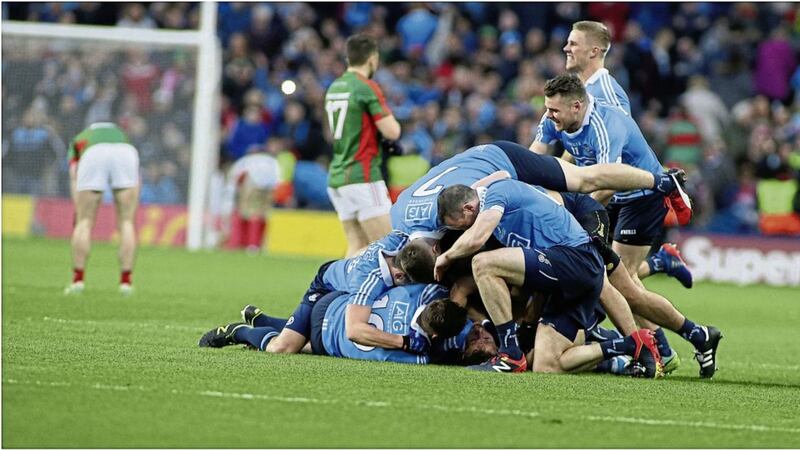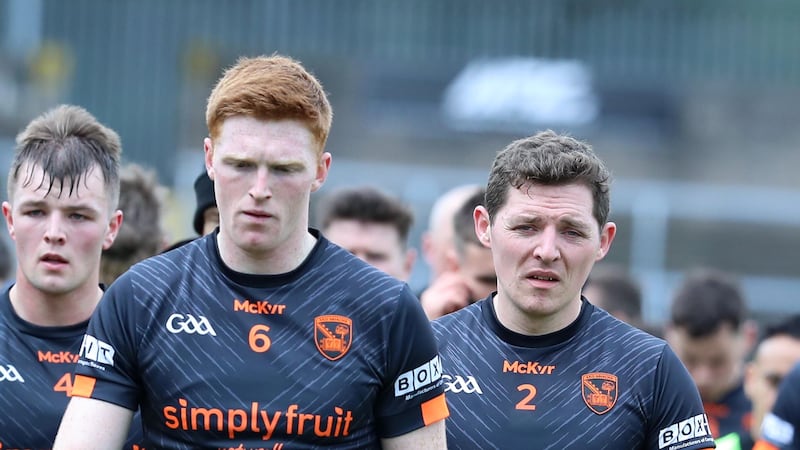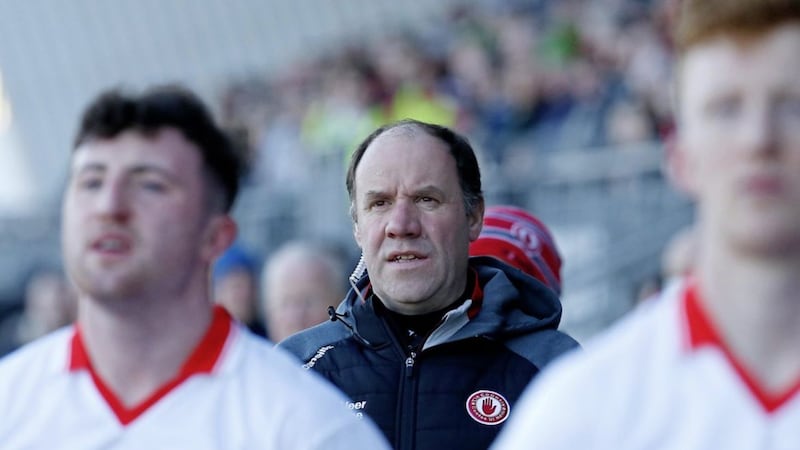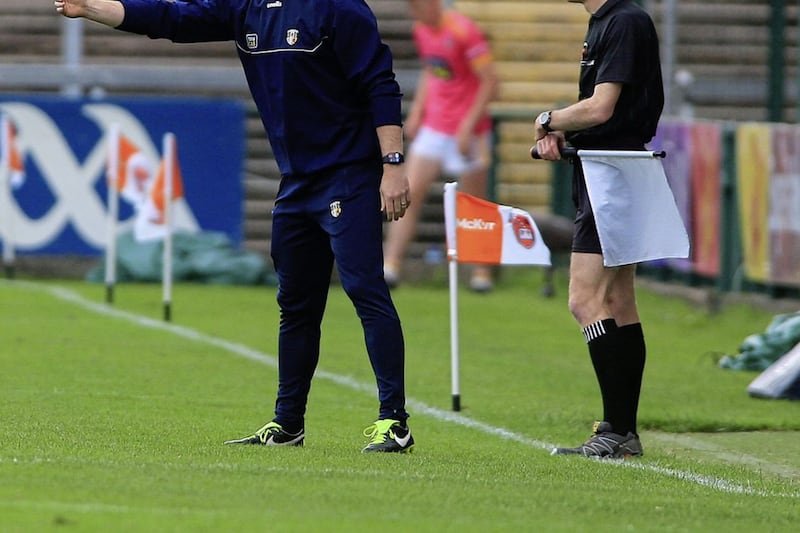AS the management merry-go-round in Ulster continues, Tyrone manager Mickey Harte has been given a three-year extension.
Harte, in my experience, has remarkable levels of hunger and belief about what he does, but even he must have taken a hit with the Dublin loss.
The manner of the defeat and the three-year extension actually lifts pressure off him and gives him room to really get to work on evolving this team. Knowing him, he will already be relishing the challenge.
That challenge is undoubtedly Dublin. While admiring their excellence, much discussion has focused on their population and financial advantages.
I have no doubt that Harte would give little time worrying about such matters as he plots Tyrone’s rise, but there is certainly a few issues I feel are worth considering for the GAA as a whole.
Dublin’s current dominance is perhaps just another cycle enjoyed by counties who come across good batches of players. Like Kerry, Armagh, Donegal, Tyrone and Cork in the past 20 years, Dublin’s time may pass. But when is a runaway train a runaway train?
The biggest change which may mean this isn’t just a ‘cycle’ is a new factor which is having an influence on our game like never before – money.
Money won’t, nor ever will be, the decisive factor. But one of the big changes in modern sport is the ability of money to influence success.
With the increasing knowledge and technological advancements that abound in areas of sports performance and team preparation, money is capable of greater impact than ever before.
For those of us who love sport, the attributes that should make champions are skills, athleticism, courage, will to win, work rate and team spirit. Such romantic ideals are increasingly just one more factor in the process of creating winners.
In Olympic competition, for example, they’re able to put a cost on medals. Team GB was able to dramatically increase their medal haul not due to unearthing a new wave of talent, but through carefully targeting certain sports calculated to give best return on investment.
Formula One, cycling’s Team Sky, top level soccer, to name but a few, are evidence that money displays a significant correlation with success.
In the world of elite sports, increasing amounts of money are invested in areas from sports medicine to sports psychology, performance analysis to strength and conditioning, player care to nutrition, all to try to find that extra one to two per cent.
Money is also critical in terms of talent identification and development. In GAA terms, this is about getting coaches into primary schools and clubs. Professional coaches have set objectives and performance measures to support the efficacy of their work.
Be it setting up development plans for U14s or showing increasing numbers of U12s in a club, these people’s jobs depend on measurable incremental improvements.
In a county with almost the same number of professional coaches as the rest of the country combined, such small results load passengers onto that runaway train.
Imagine the impact if every club in Antrim had a full-time professional coach.
Dublin always had heavier financial clout, but with the appointment of Pat Gilroy as senior football manager in 2009, Dublin got an excellent two-for-one deal.
Not only did he change the mindset of an under-performing group to that of perpetual champions but, using his own business acumen, he established a real business mindset around the senior team and its finances.
This, combined with the business savvy and strategic Dublin County Board and the appointment of Tomás Quinn as commercial manager in 2014, has really sharpened their financial claws. In contrast to the unfulfilled potential of the likes of Meath and Cork, Dublin’s approaches have enabled them to make the most of their position, which is to be commended.
Equally, though, it must be recognised that strong backing from the GAA has significantly bolstered their efforts.
A thriving Dublin is good for the GAA, but there comes a time when, having created a beast, it’s maybe wise to stop feeding it and, while I don’t believe in splitting Dublin, I do believe the money train needs diverted.
Sports and politics should never mix so forgive me for using the EU for comparison.
In the EU, just as in sport, there are ‘haves’ and ‘have nots’. The whole concept of the arrangement is mutual benefit.
The stronger economies like Germany, Britain and France are net contributors, giving in more money than they get out.
This surplus money is used to help build up the ‘poorer’ countries, which in turn helps drive growth in the EU as a whole. Everyone benefits. Nigel Farage may disagree, but don’t think he was ever a role model Gael.
In the GAA at present, you have counties breaking their backs in terms of both financial and physical effort, trying to produce teams to remain competitive. This level of effort has resulted in the increased levels of the games, the increased television deals and media coverage, the increased advertising revenue.
There is more money rolling into the association than ever before.
In this game of economies, Dublin are on a completely different level.
Due to being the capital and, yes, due to their own commercial strategy, they gain more than anybody as the game develops. Yet in GAA land, when it comes to dividing out the spoils of our amateur association, Dublin end up getting more than the other 31 counties combined. It’s laughable if it wasn’t so absurd.
The usual reasoning put forward is either looking at per capita spending or facing down the competition of soccer or rugby. Neither, for me, can defend the disparity between coaching and development provision between Dublin and other counties.
John Costello, Dublin’s CEO, in arguing against any thought of financial bias, kindly said Dublin are more than happy to show other counties their strategies so that they may copy them.
Give me a break. Imagine Germany showing Greece around to show them how things should be done and expecting them to sort it out while, at the same time, Germany continued to receive the lion’s share of EU development money.
Surely there is a moral and even strategic need for monies to be pooled centrally and a revision of the funding frameworks.
It remains incumbent on other counties to ensure long-term strategies and structures are in place and that finances are optimally run, but money plays a central role in the expertise
to develop and execute such plans.
To deny such is accepting an increasingly lopsided game where the feared risks of other sports or interests will certainly take hold.
In the end, we love our games for the nature of that 15 v 15 battle, for the underdog taking on the favourite or the big teams going toe to toe.
We will always be better off for having strong teams and especially the unique pulling power of a strong Dublin.
At this stage it’s not about stopping Dublin, it’s about helping others up.
It’s about trying to get everyone a seat on the train.








